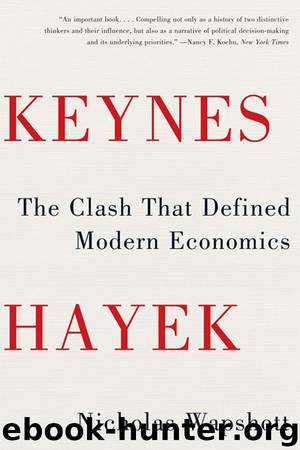Keynes Hayek: The Clash that Defined Modern Economics by Nicholas Wapshott

Author:Nicholas Wapshott [Wapshott, Nicholas]
Language: eng
Format: epub
Publisher: W. W. Norton & Company
Published: 0101-01-01T00:00:00+00:00
FOURTEEN
The Wilderness Years
Mont-Pèlerin and Hayek’s Move to Chicago, 1944–69
Hayek did little to build on the popular success of The Road to Serfdom in America. He was a reluctant public figure and found that the acclamation he received on his book tour disturbed his decorum. “I was asked to come over to give five series of lectures at five universities,” he recalled. “I imagined very sedate academic lectures, which I had written out very carefully. . . . While I was on the high seas, the condensation of The Road to Serfdom in the Reader’s Digest appeared. So when I arrived I was told . . . I was to go on a public lecture tour around the country. I said, ‘My God, I have never done this. I can’t possibly do it. I have no experience in public speaking.’ [They said], ‘Oh, it can’t be helped now.’”1
Hayek found the vast audiences alarming. “I rather imagined a little group of old ladies like the Hokinson2 women in the New Yorker,” he remembered. “I asked, ‘What sort of audience do you expect?’ They said, ‘The hall holds 3,000, but there’s an overflow meeting.’ Dear God, I hadn’t an idea what I was going to say.” For the next five weeks he crisscrossed America, speaking to attentive crowds. He had become an instant hero. Over time he came to take pleasure in playing the role of seer and sage, but the actor’s life did not come naturally. “What I did in America was a very corrupting experience,” he recalled. “You become an actor, and I didn’t know I had it in me. But given the opportunity to play with an audience, I began enjoying it.”3
It is worth speculating how the battle with Keynesian ideas would have turned out had Hayek been more of a showman. Keynes knew how to sell his ideas. He was a master of the op-ed article and enjoyed being the center of attention. Had Hayek possessed Keynes’s self-confidence, his commercial nous, and his love of performance, he might have been able to persuade more people that managing an economy was not desirable. He had self-confidence, but perhaps his heavy accent and his introverted nature worked not only against him but also against his ideas. One colleague described Hayek at this time as “very correct and rather serious, portly, gracious, slow, rather ponderous-speaking, sometimes thinking what his next sentence is going to be.”4 Hardly the qualities of a media star. Whatever the merits of the argument between Keynes and Hayek, Keynes held the advantage, even after his death.
Hayek was admired, but he was not widely liked, except by those who knew him well. He was known as a contrarian, which attracted him to mavericks but did not endear him to those who liked to belong. Keynes offered a hopeful view of the future, with everyone employed, based on an optimistic view of human nature. Hayek was a doubter and pessimist: those who strived to make the world better would likely end up inviting unintended consequences.
Download
This site does not store any files on its server. We only index and link to content provided by other sites. Please contact the content providers to delete copyright contents if any and email us, we'll remove relevant links or contents immediately.
International Integration of the Brazilian Economy by Elias C. Grivoyannis(106941)
The Radium Girls by Kate Moore(12006)
Turbulence by E. J. Noyes(8011)
Nudge - Improving Decisions about Health, Wealth, and Happiness by Thaler Sunstein(7684)
The Black Swan by Nassim Nicholas Taleb(7092)
Rich Dad Poor Dad by Robert T. Kiyosaki(6583)
Pioneering Portfolio Management by David F. Swensen(6277)
Man-made Catastrophes and Risk Information Concealment by Dmitry Chernov & Didier Sornette(5987)
Zero to One by Peter Thiel(5772)
Secrecy World by Jake Bernstein(4732)
Millionaire: The Philanderer, Gambler, and Duelist Who Invented Modern Finance by Janet Gleeson(4451)
The Age of Surveillance Capitalism by Shoshana Zuboff(4272)
Skin in the Game by Nassim Nicholas Taleb(4228)
The Money Culture by Michael Lewis(4178)
Bullshit Jobs by David Graeber(4169)
Skin in the Game: Hidden Asymmetries in Daily Life by Nassim Nicholas Taleb(3983)
The Dhandho Investor by Mohnish Pabrai(3746)
The Wisdom of Finance by Mihir Desai(3722)
Blockchain Basics by Daniel Drescher(3570)
